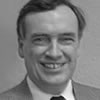 Colin Aitken – Forensic statistician
Colin Aitken – Forensic statistician
I was Professor of Forensic Statistics in the University of Edinburgh until I retired in 2016. I graduated in 1974 with a BSc in Mathematical Sciences from the University of Edinburgh, then took a Diploma in Mathematical Statistics at the University of Cambridge and a PhD in Statistics at the University of Glasgow. It was there I met my first statistical problem in forensic science, when I was asked to advise a forensic odontologist on the evidence of bite marks. Whilst still involved with that problem, I took up a lectureship at the University of Strathclyde. There was a Forensic Science Unit there, and I collaborated with members of the unit on problems of evidence evaluation for hair.
One of the forensic science lecturers I met at Strathclyde moved to Australia where he was, until retirement, Director of Forensic Services for the Australian Federal Police. In 2002 I presented a plenary talk in Canberra at the 16th Symposium of the Australian and New Zealand Forensic Science Society at his invitation. Little did I realise when we first met over twenty years previously that one outcome would be an all-expenses-paid trip to the other side of the world!
After a couple of years at Strathclyde I moved full circle back to the University of Edinburgh to be a Lecturer in Statistics, where I have remained ever since. I have continued to work in statistics as applied to forensic science. In 1995 I wrote a book entitled ‘Statistics and the evaluation of evidence for forensic scientists’ and in 2004 a second edition was published, written in conjunction with a forensic scientist. The book is in use all over the world and such is the growth in the subject that the second edition is almost twice the length of the first. Since retirement, I am working on a third edition of the book with the collaboration of two forensic scientists and another statistician.
I have occasionally helped police with their enquiries, and lawyers with criminal cases. For a while I was fortunate to obtain grant funding to appoint a research fellow to help with research and with solving the non-trivial problems which arise.
I have been fortunate to work in a university environment. There, one is encouraged to pursue knowledge for its own sake and not in response to particular problems. Over many years whilst the subject of forensic statistics was developing, I was able to assist in that development without the demands of solving particular projects to short deadlines. It is difficult to imagine another career in which I could have worked in such a way.
Take a look at our guide to becoming a forensic statistician.